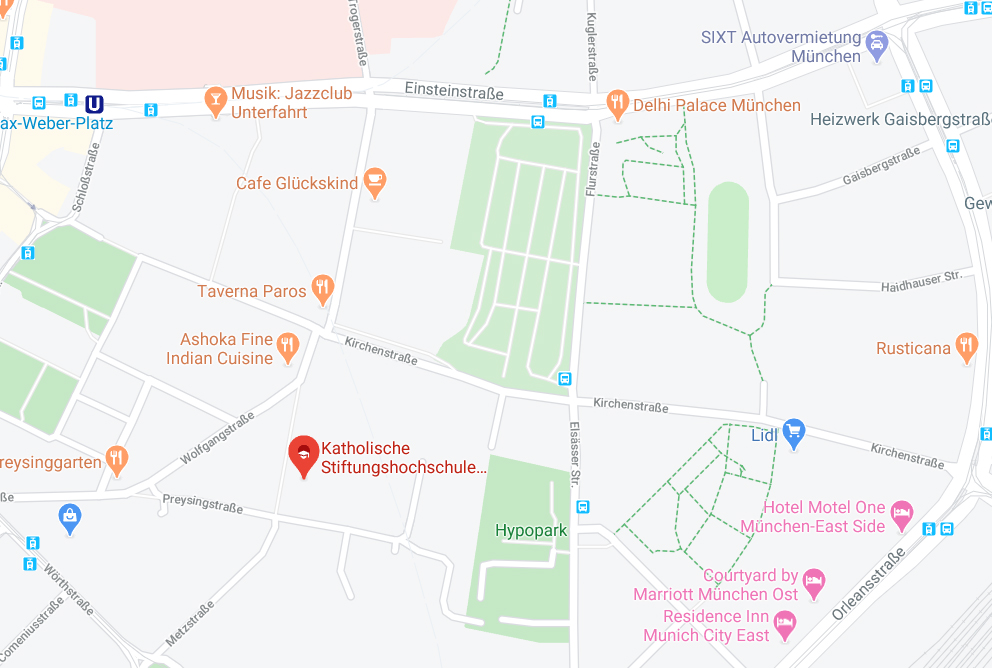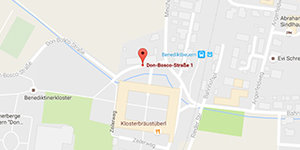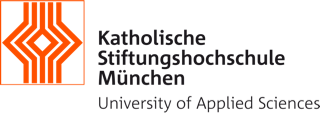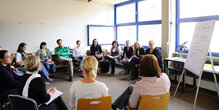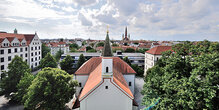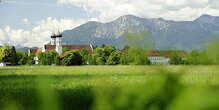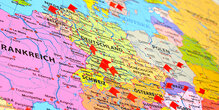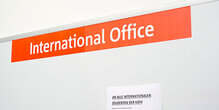Social Work (M.A.)
Study location
Munich and Benediktbeuern (Institute for Advanced and Further Training, IF)
Academic degree
Master of Arts (M.A.)
Start of the degree programme
every 2 years in the winter semester
Standard period of study
5 semesters, of which 4 are spent in attendance at the university
Admission procedure & applications
Gertrud Deiser
Application period
online 01.-31.03.
Structure of the curriculum
Compulsory modules
- Theories of social work
- Applied ethics
- Social administration and social policy
- Empirical social research
- International social work
- Independent studies (independent research work)
- Master’s thesis
Compulsory elective modules
- Research and diagnostics
- Forms of intervention Personnel development and consulting
- Management and quality development
- Concepts and approaches to the management of social organisations
Structure of the curriculum:
Duration: The degree programme is offered part-time in parallel to work over a total of 5 semesters, of which 4 are spent in attendance at the university. Every module lasts 2 semesters.
Workload: The workload amounts to a total of 2,700 hours. 90 credit points can be obtained.
Attendance and self-study:
- Studies take place in the form of regular attendance phases in the first four semesters, together with intensively supervised self-study, especially in the 5th semester, during which the Master's thesis is written.
- The attendance phases take place in 24 blocks, each of which is on Thursday 12.30pm - 7.15pm, Friday 9am - 7.15pm, Saturday 9am - 2pm.The attendance phases alternate between Benediktbeuern and Munich.Blocks do not fall in the (Bavarian) school holidays or on public holidays
The self-study is supported by teaching materials.
The degree programme
The focus of this five-semester further education programme is on the science and practice of social work. This degree programme’s generalist orientation is the way in which the KSH would like to make an important contribution to the further development of this discipline and profession of social work. Another special feature is the explicit consideration of and emphasis on ethical dimensions.
The degree programme is primarily aimed at university graduates with relevant practical experience in social work who wish to qualify for management tasks as well as scientific and research activities. As such, the focus is on application-orientated research.
The degree programme was already accredited by ACQUIN in 2003 as one of the first Master's degree programmes in social work, and re-accreditation by ACQUIN in 2014 until 2021 was without conditions. The studies lead to the academic degree of Master of Arts (M.A.).
Admission requirements
Admission requirements are a completed university degree or university of applied sciences degree, and at least two years of relevant full-time professional work experience in social work after graduation. Part-time activities will be credited on a proportional basis. Practical phases before completion of the first degree cannot be recognised.
Objectives & contents
Course objectives:
In the part-time postgraduate Master's degree programme in Social Work
- the key focus is on social work as a scientific discipline and profession.
- the science of social work and the professionalisation of social work are developed further.
- the science and practice of social work are linked with each other.
- an academic vocational training opportunity is offered in parallel to work for practitioners after a practical phase.
- university graduates with relevant practical experience in social work can qualify for management tasks as well as scientific and research activities.
- a qualification is obtained which enables a career in senior public service.
- access to a doctoral degree is made easier.
- the admission requirements for training as a child and youth psychotherapist can potentially be achieved.
Structure of the curriculum
Compulsory modules
- Theories of social work
- Applied ethics
- Social administration and social policy
- Empirical social research
- International social work
- Independent studies (independent research work)
- Master’s thesis
Compulsory elective modules
- Research and diagnostics
- Forms of intervention Personnel development and consulting
- Management and quality development
- Concepts and approaches to the management of social organisations
Structure of the curriculum:
Duration: The degree programme is offered part-time in parallel to work over a total of 5 semesters, of which 4 are spent in attendance at the university. Every module lasts 2 semesters.
Workload: The workload amounts to a total of 2,700 hours. 90 credit points can be obtained.
Attendance and self-study:
- Studies take place in the form of regular attendance phases in the first four semesters, together with intensively supervised self-study, especially in the 5th semester, during which the Master's thesis is written.
- The attendance phases take place in 24 blocks, each of which is on Thursday 12.30pm - 7.15pm, Friday 9am - 7.15pm, Saturday 9am - 2pm.The attendance phases alternate between Benediktbeuern and Munich.Blocks do not fall in the (Bavarian) school holidays or on public holidays
The self-study is supported by teaching materials.
Prospects & perspectives
This Master's degree enables a career in senior public service. Depending on the type of activity, a corresponding higher classification is possible. To date, a Master's degree is not a standard degree in the field of social work. It should rather be seen as an 'investment for the future', without a (job) guarantee. Results are available from a Master's graduates survey at the KSH (2013), on the transition to employment of over 100 Master’s degree graduates. In this survey, it became apparent that many sponsors of social work are not (yet) prepared for - and often haven’t (yet) created specific positions for - Master’s graduates, but many graduates have nevertheless obtained good positions in the field. For approximately a third of all graduates, a move to a better paid and more suitable position for their Master’s degree was possible, around three years after their graduation.
Costs
- around 7,400 Euros payable in 5 instalments
- 400 Euros examination fee (one-off payment)
- fees for the Studentenwerk München (student union) are payable for each semester
- costs for accommodation, meals, study materials and books are not included
- there is no entitlement to a semester ticket
Applications & admission
The next degree programme will start in October 2021. Online applications are only possible in the period from 01 - 31 March 2021. The notifications of admission will be sent out in April 2021. If the number of applications exceeds the 25 places available on the course, admission is granted based on regulations (rules) adopted by the KSH.
If you have a foreign higher education entrance qualification or a foreign university degree, and wish to apply for a Bachelor's degree programme at the KSH Munich, you must first have your foreign certificates checked by the external service provider uni-assist e.V.. The pre-evaluation documentation obtained from uni-assist e.V. must be submitted together with the application documents. For more information, please see the section on Information for Foreign Applicants. German language skills at B1/B2 level are expected.
Contacts
Study counseling
Prof. Dr. Andreas Kirchner
Studiengangsleitung
Telefon: +49 8857 88-556
andreas.kirchner@ksh-m.de
Social Work (M.A.)
Study location
Munich and Benediktbeuern (Institute for Advanced and Further Training, IF)
Academic degree
Master of Arts (M.A.)
Start of the degree programme
every 2 years in the winter semester
Standard period of study
5 semesters, of which 4 are spent in attendance at the university
Admission procedure & applications
Gertrud Deiser
Application period
online 01.-31.03.
Structure of the curriculum
Compulsory modules
- Theories of social work
- Applied ethics
- Social administration and social policy
- Empirical social research
- International social work
- Independent studies (independent research work)
- Master’s thesis
Compulsory elective modules
- Research and diagnostics
- Forms of intervention Personnel development and consulting
- Management and quality development
- Concepts and approaches to the management of social organisations
Structure of the curriculum:
Duration: The degree programme is offered part-time in parallel to work over a total of 5 semesters, of which 4 are spent in attendance at the university. Every module lasts 2 semesters.
Workload: The workload amounts to a total of 2,700 hours. 90 credit points can be obtained.
Attendance and self-study:
- Studies take place in the form of regular attendance phases in the first four semesters, together with intensively supervised self-study, especially in the 5th semester, during which the Master's thesis is written.
- The attendance phases take place in 24 blocks, each of which is on Thursday 12.30pm - 7.15pm, Friday 9am - 7.15pm, Saturday 9am - 2pm.The attendance phases alternate between Benediktbeuern and Munich.Blocks do not fall in the (Bavarian) school holidays or on public holidays
The self-study is supported by teaching materials.
The degree programme
The focus of this five-semester further education programme is on the science and practice of social work. This degree programme’s generalist orientation is the way in which the KSH would like to make an important contribution to the further development of this discipline and profession of social work. Another special feature is the explicit consideration of and emphasis on ethical dimensions.
The degree programme is primarily aimed at university graduates with relevant practical experience in social work who wish to qualify for management tasks as well as scientific and research activities. As such, the focus is on application-orientated research.
The degree programme was already accredited by ACQUIN in 2003 as one of the first Master's degree programmes in social work, and re-accreditation by ACQUIN in 2014 until 2021 was without conditions. The studies lead to the academic degree of Master of Arts (M.A.).
Admission requirements
Admission requirements are a completed university degree or university of applied sciences degree, and at least two years of relevant full-time professional work experience in social work after graduation. Part-time activities will be credited on a proportional basis. Practical phases before completion of the first degree cannot be recognised.
Objectives & contents
Course objectives:
In the part-time postgraduate Master's degree programme in Social Work
- the key focus is on social work as a scientific discipline and profession.
- the science of social work and the professionalisation of social work are developed further.
- the science and practice of social work are linked with each other.
- an academic vocational training opportunity is offered in parallel to work for practitioners after a practical phase.
- university graduates with relevant practical experience in social work can qualify for management tasks as well as scientific and research activities.
- a qualification is obtained which enables a career in senior public service.
- access to a doctoral degree is made easier.
- the admission requirements for training as a child and youth psychotherapist can potentially be achieved.
Structure of the curriculum
Compulsory modules
- Theories of social work
- Applied ethics
- Social administration and social policy
- Empirical social research
- International social work
- Independent studies (independent research work)
- Master’s thesis
Compulsory elective modules
- Research and diagnostics
- Forms of intervention Personnel development and consulting
- Management and quality development
- Concepts and approaches to the management of social organisations
Structure of the curriculum:
Duration: The degree programme is offered part-time in parallel to work over a total of 5 semesters, of which 4 are spent in attendance at the university. Every module lasts 2 semesters.
Workload: The workload amounts to a total of 2,700 hours. 90 credit points can be obtained.
Attendance and self-study:
- Studies take place in the form of regular attendance phases in the first four semesters, together with intensively supervised self-study, especially in the 5th semester, during which the Master's thesis is written.
- The attendance phases take place in 24 blocks, each of which is on Thursday 12.30pm - 7.15pm, Friday 9am - 7.15pm, Saturday 9am - 2pm.The attendance phases alternate between Benediktbeuern and Munich.Blocks do not fall in the (Bavarian) school holidays or on public holidays
The self-study is supported by teaching materials.
Prospects & perspectives
This Master's degree enables a career in senior public service. Depending on the type of activity, a corresponding higher classification is possible. To date, a Master's degree is not a standard degree in the field of social work. It should rather be seen as an 'investment for the future', without a (job) guarantee. Results are available from a Master's graduates survey at the KSH (2013), on the transition to employment of over 100 Master’s degree graduates. In this survey, it became apparent that many sponsors of social work are not (yet) prepared for - and often haven’t (yet) created specific positions for - Master’s graduates, but many graduates have nevertheless obtained good positions in the field. For approximately a third of all graduates, a move to a better paid and more suitable position for their Master’s degree was possible, around three years after their graduation.
Costs
- around 7,400 Euros payable in 5 instalments
- 400 Euros examination fee (one-off payment)
- fees for the Studentenwerk München (student union) are payable for each semester
- costs for accommodation, meals, study materials and books are not included
- there is no entitlement to a semester ticket
Applications & admission
The next degree programme will start in October 2021. Online applications are only possible in the period from 01 - 31 March 2021. The notifications of admission will be sent out in April 2021. If the number of applications exceeds the 25 places available on the course, admission is granted based on regulations (rules) adopted by the KSH.
If you have a foreign higher education entrance qualification or a foreign university degree, and wish to apply for a Bachelor's degree programme at the KSH Munich, you must first have your foreign certificates checked by the external service provider uni-assist e.V.. The pre-evaluation documentation obtained from uni-assist e.V. must be submitted together with the application documents. For more information, please see the section on Information for Foreign Applicants. German language skills at B1/B2 level are expected.
Contacts
Study counseling
Prof. Dr. Andreas Kirchner
Studiengangsleitung
Telefon: +49 8857 88-556
andreas.kirchner@ksh-m.de
